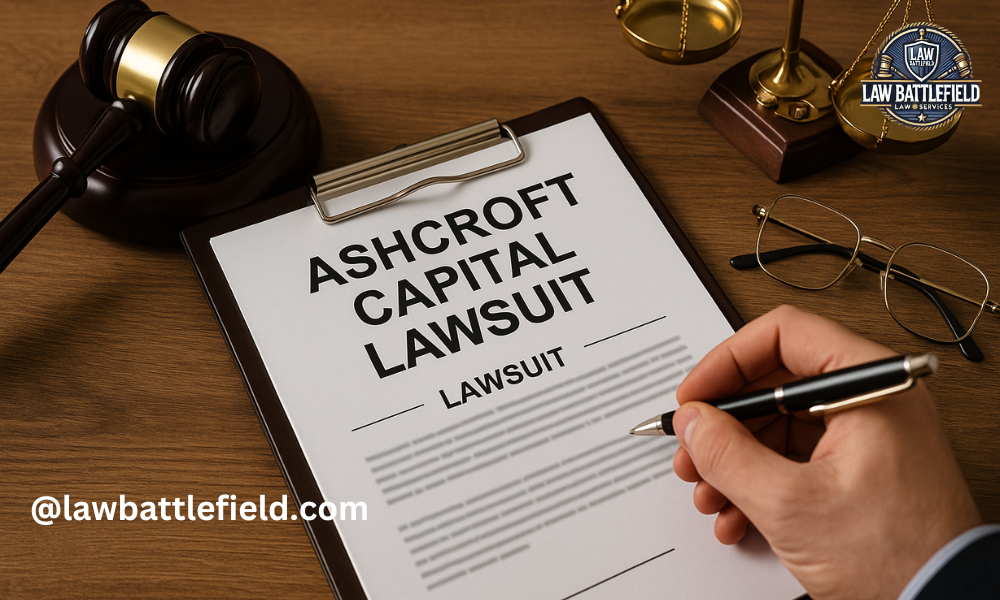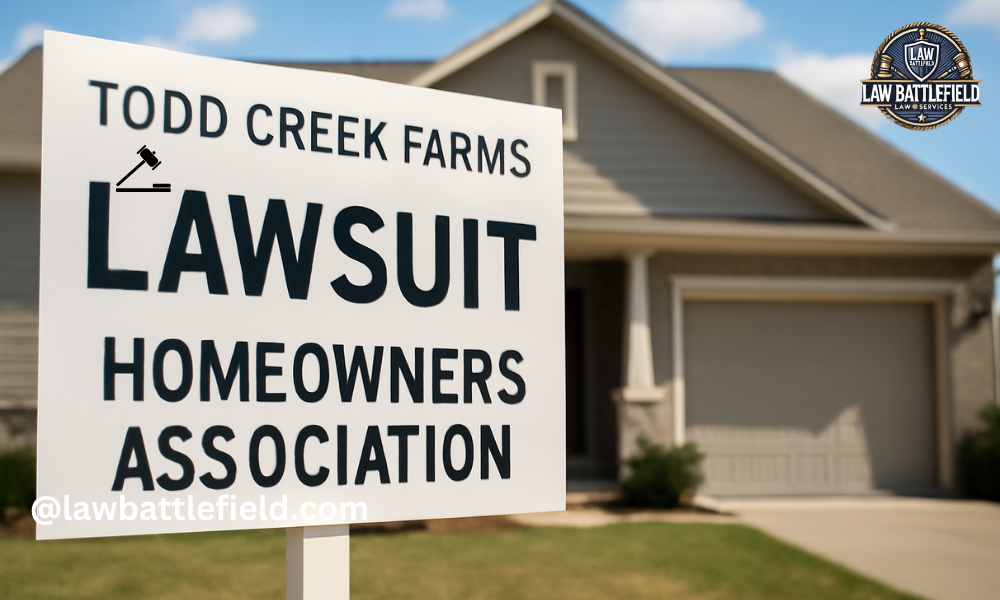Introduction To The Ashcroft Capital Lawsuit
The Ashcroft Capital lawsuit has raised many questions in the real estate world. Investors who trusted the company are now looking for answers. This legal issue is about how the company managed money and made promises to investors. Some people believe they were not told the full truth. Others say the company gave numbers that looked better than they were.
Ashcroft Capital is known for buying apartment buildings and raising money from everyday investors. Many people liked the idea of owning a piece of real estate without managing it. But things started to change when deals did not go as planned. Some properties lost value. Some investors were asked to give more money. This created stress and confusion.
This lawsuit is important for investors and real estate experts. It shows how things can go wrong, even with big companies. Many want to understand what happened with the Ashcroft Capital lawsuit, so they can protect themselves in the future. This case is also a lesson for others who are thinking about putting money into similar real estate deals.
In this article, you will learn what led to the lawsuit, who is involved, what investors are saying, and what it means for the future. If you have heard about Ashcroft Capital and want to know the full story, this guide will help.
Overview Of Ashcroft Capital
Ashcroft Capital is a real estate investment company. It started in 2015. The company was founded by Frank Roessler and Joe Fairless. Both had experience in real estate and finance. Their goal was to help people invest in apartment buildings without doing the work of owning property.
The company focused on buying large multifamily properties. These properties are apartment buildings with many rental units. Most of the buildings are in the Sun Belt region. This area includes places like Texas, Florida, Georgia, and Arizona. These states have warm weather, growing cities, and strong job markets. Ashcroft believed this made the properties a smart investment.
The company raised money from everyday people, not just big banks or hedge funds. They offered chances to passive investors who wanted to earn income from rent and property growth. Ashcroft used a system called syndication. This means many people pool their money together to buy large properties.
Over time, Ashcroft Capital grew fast. It built a name in the multifamily real estate world. It managed over $2 billion in assets under management (AUM). The company had more than 3,000 investors. Many trusted the team because of their strong marketing, podcast presence, and promises of high returns.
But problems started when some properties underperformed. Investors began asking questions. The numbers didn’t match the early claims. This later led to the Ashcroft Capital lawsuit, which raised concerns about how the company managed deals and shared information.
Background & Timeline Of The Ashcroft Capital Lawsuit
The Ashcroft Capital lawsuit began after many investors started noticing problems. At first, people trusted the company. They liked the idea of earning money from large apartment buildings. But soon, things started to feel wrong.
Investors were told they would get good returns. But in many deals, the numbers were lower than expected. Some properties lost value. Others needed more money to stay open. That’s when capital calls began. A capital call is when a company asks investors to give more money to support a project. For many, this was a surprise. They were not ready for it. Some felt they were not warned about this risk in the beginning.
These problems made investors worried. They started asking more questions. They wanted to see reports. They wanted to know how money was spent. Some believed the company gave early promises that did not match reality. This created tension between investors and the Ashcroft team.
In March 2024, a group of investors took legal action. The case was named Cautero v. Ashcroft Legacy Funds. It was filed in Texas. These investors said the company gave misleading information. They also claimed Ashcroft did not share important risks. Around 12 investors joined the case. Together, they had put in over $18 million across different deals.
The lawsuit made headlines in the real estate world. Many people began talking about it on forums, podcasts, and news blogs. The focus was not just on money loss—it was also on trust, communication, and how real estate syndications should work.
Who’s Involved: Key Parties In The Ashcroft Capital Lawsuit
The Ashcroft Capital lawsuit involves two main groups — the investors who filed the case and the leaders of Ashcroft Capital.
Plaintiffs: The Investors
The lawsuit was filed by a group of 12 accredited investors. These are people who meet certain income or net worth rules and are allowed to invest in private deals. Together, they had invested about $18 million across multiple Ashcroft properties. These investors say they were misled. They believe the company did not share the full truth about the deals. Some also say they were surprised by extra money requests, known as capital calls.
The investors joined together to file a single lawsuit. They wanted the court to review how Ashcroft handled their money, shared information, and reported returns. Many of them also raised concerns about missing reports and unclear updates on projects.
Defendants: Ashcroft Capital Leadership
The lawsuit named Ashcroft Capital and its top leaders as defendants. The main people involved are Frank Roessler, the founder and CEO, and Joe Fairless, who helped build the company’s public image through podcasts and speaking events. Both were known in the real estate world for promoting passive income through multifamily investing.
The investors believe these leaders gave high hopes through strong marketing and bold return numbers. The lawsuit claims that some of these promises were not realistic.
Legal Teams And Advisors
Both sides hired legal teams to fight the case. The investors are working with lawyers who focus on investment fraud and financial lawsuits. These attorneys are trying to prove that the company did not meet its duty to the investors.
Ashcroft Capital also has legal counsel. Their lawyers are defending the company. They say Ashcroft acted in good faith and followed all the rules. They argue that the risks were clearly written in the documents that investors signed.
Investor Reactions & Community Discussion
The Ashcroft Capital lawsuit has caused a strong reaction online. Many investors have shared their views on forums like Reddit, BiggerPockets, and WallStreetOasis. These are places where real estate investors talk about deals, share advice, and post updates.
One of the biggest debates is about Class A vs Class B shares. In many Ashcroft deals, Class A investors got fixed returns, while Class B investors shared in the upside. When capital calls began, some Class B investors felt they were being treated unfairly. They were asked to give more money, even though the returns were not as expected.
Many people expressed shock and frustration. Some believed they were not told the full risk before investing. Others said they trusted the company’s podcasts and strong marketing but now feel misled.
“I thought I was putting money into a stable deal. I didn’t expect capital calls or cash flow issues,” one Reddit user posted.
“They sold it like a sure thing. Now I feel like I’m chasing my own money,” said another user on BiggerPockets.
The lawsuit sparked new concerns about how syndicators manage deals. Investors are now more cautious. They want more reporting, better risk warnings, and stronger legal protections.
Ashcroft Capital’s Response & Defense
Ashcroft Capital has also shared its side of the story. The company says it followed the rules, gave clear disclosures, and operated in good faith. In public statements, Ashcroft claims it warned investors about the risks, including rising interest rates, loan issues, and market shifts.
The company also says all deals were offered under SEC-compliant documents. This means investors had to read and sign private placement memorandums (PPMs) that explained the risks. Ashcroft believes it did its part and followed the law.
In court, Ashcroft’s lawyers have filed motions to dismiss some of the claims. They argue the investors knew what they were getting into. The case is now in the discovery phase, where both sides collect documents, emails, and other records.
Ashcroft hopes to prove that it acted with honesty and did not break any promises. But the lawsuit is still active, and the outcome is not yet known.
Recent Developments & Litigation Status
The Ashcroft Capital lawsuit is still going on. As of May and July 2025, there has been no confirmed payout or settlement. The case is in the discovery phase. This means both sides are sharing documents, emails, and other records. Lawyers are trying to find proof to support their claims.
Some reports say there have been early settlement talks, but nothing has been made public. Investors are waiting to see what will happen next. The court is reviewing the information and will decide if the case should move forward or be dismissed.
So far, no final decision has been made. The case is active, and updates are expected in the coming months.
Potential Outcomes & Implications Of The Ashcroft Capital Lawsuit
The Ashcroft Capital lawsuit could end in a few ways:
Settlement
The most likely result is a settlement. This means Ashcroft may agree to pay some money to investors without admitting guilt. A settlement can save time and legal costs for both sides. Many lawsuits end this way.
Court Ruling
If there is no settlement, the case could go to trial. A judge or jury would decide who is right. This process can take months or even years. If investors win, they could get compensation. If Ashcroft wins, the case will be dismissed with no penalty.
Dismissal
Ashcroft’s legal team has asked the court to dismiss the case. If the judge agrees, the lawsuit could end early. This would mean the court found no strong legal reason to move forward.
Industry Impact
This lawsuit is more than just one case. It could change how real estate syndications work in the future. Many investors now want:
- More clear information before investing
- Better risk warnings in legal papers
- Regular updates and full access to reports
The lawsuit is also a wake-up call for sponsors. Many will now review their fee structures, reporting methods, and communication with investors.
It may also lead to new rules and oversight. Regulators could ask companies to follow stricter reporting laws or protect passive investors better. This could affect how REITs and private real estate funds raise money.
Conclusion
The Ashcroft Capital lawsuit has raised big questions in the world of real estate investing. It is not just about one company. It is about how real estate deals are made, how risks are shared, and how much trust investors can place in a sponsor.
We looked at how investors claimed they were misled, how capital calls caused concern, and how returns were possibly overstated. We also explored what the company had to say, how the lawsuit is moving forward, and what this means for future deals.
This case reminds all investors to focus on transparency, fiduciary duty, and due diligence. Sponsors must clearly show the risks. Investors must ask the right questions. Both sides must work together with honesty and fairness.
The lawsuit may change how syndications work. More rules, better reports, and safer terms could become the norm. That would be a positive outcome for the whole industry.
FAQs
What Is The Ashcroft Capital Lawsuit About?
The Ashcroft Capital lawsuit is a legal case filed by investors who claim the company gave misleading information, overstated returns, and failed to warn them about key risks like capital calls and loan issues.
Who Filed The Lawsuit?
A group of 12 accredited investors filed the lawsuit in Texas. Together, they had invested over $18 million in Ashcroft Capital deals.
Has There Been Any Payout Or Settlement?
As of May/July 2025, there has been no confirmed payout or settlement. The case is still active and in the discovery phase.
Should Investors Still Trust Ashcroft Capital?
That depends on your own research. Some investors feel the company broke their trust. Others believe Ashcroft acted within the rules. If you are thinking about investing, always review the full deal, speak to a legal advisor, and ask for detailed reports.
How Can Investors Stay Informed?
You can stay updated by following news from real estate blogs, finance forums, and court records. It also helps to be part of communities like BiggerPockets, Reddit, or WallStreetOasis, where real investors share live updates.
Was this article helpful? Check out more on Lawbattlefield.com
Augusta Precious Metals Lawsuit: What Investors Need To Know In 2025





